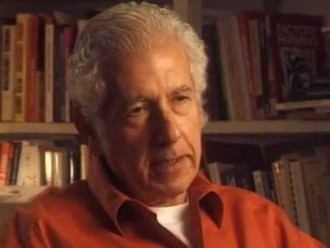
Henry: One Man's Way 1997
Distributed by Bullfrog Films, PO Box 149, Oley, PA 19547; 800-543-FROG (3764)
Produced in association with Open Channel
Directed by John Swindells
VHS, color, 53 min.
College - Adult
Sociology, Environmental Studies
Date Entered: 11/09/2018
ALA Notable: ALA.gif
Reviewed by Pamela Rose, Health Sciences Library, University at Buffalo, State University of New York
"Change is a lot more rapid and a lot more enduring if you get the cooperation of what would otherwise be your adversary." Henry Spira 1927-1998
Effecting change was Henry Spira's forte. Henry was the coordinator of Animal Rights International (ARI) in New York City until his death on September 12th, 1998 (after this video was finished). In Henry: One Man's Way, his longtime friend and colleague, Peter Singer, has created a powerful and enduring portrait of this social activist's thoughtful and strategic approach to solving problems of great social significance.
Henry's genius was recognizing that to effect change, you must not only "speak the language" of those whose behavior you wish to alter; you must also be able to build bridges between conflicting values and arrive at a common working goal. Through this unique approach, Henry has halted selected animal experiments, been instrumental in the creation of the Center for Alternatives to Animal Testing and the Johns Hopkins Center for a Livable Future, effected policy changes at the USDA, and altered inhumane methods formerly used to slaughter cattle. Henry worked tirelessly until his death from esophageal cancer as this review was being written.
Born in Antwerp, Belgium in 1927, Henry's "dysfunctional" and peripatetic family eventually moved to New York City. Henry became a vegan after realizing the hypocrisy of "petting one animal and sticking a fork in another." Realizing his developing social consciousness was at odds with his father's traditional values, he struck out on his own at the age of 16. After working on merchant marine ships and serving in the U.S. military, Henry began publishing articles in the Socialist Worker's Party publications which he used as a vehicle to further his agenda. His writings exposed Herbert Hoover and the FBI, gave firsthand accounts of the revolution in Cuba, and reported on civil rights in the South. After connecting with teacher and activist Peter Singer by attending his adult education class on animal rights, Henry formed a nascent group that cut their teeth on the task of halting 20 years of experimentation on cats and kittens at the Museum of Natural History in New York. Continuing to apply the strategies of the human rights movement to the animal cause, they persuaded Revlon, the giant in the cosmetics industry in the 1970s, to cease using the Draize test and invest in developing alternatives to animal testing. This landmark event which Henry engineered legitimized the animal rights movement and provided the tools for tackling other animal treatment issues such as face branding and shackling/hoisting.
Henry knew that you must be "aware of the way people are... the real world," and that you must "put yourself in the place of the people you are trying to change." His clarity of vision and simple lifestyle were in stark contrast to his sophisticated understanding of his adversaries, many of whom respected and admired him. Peter Singer has effectively interwoven images of Henry's simple life with his beloved cat, interviews with those who worked with him, footage of demonstrations, and provocative images of animal abuse, into a tapestry that will serve to inspire generations of social activists to come.
Highly recommended for junior high through adult audiences. A must for public and academic libraries.
"Effectively a training video for political activism" -- The Republican, Australia.
Read an obituary and interview of Henry and a review of Peter Singer's biography http://www.vegan.com/, a number of articles written by Henry http://www.vegan.com/current/hs0707985.html and an article in Forum for Applied Research and Public Policy (v.11 no. 1) which quotes Henry http://forum.ra.utk.edu/nr-spira.htm.